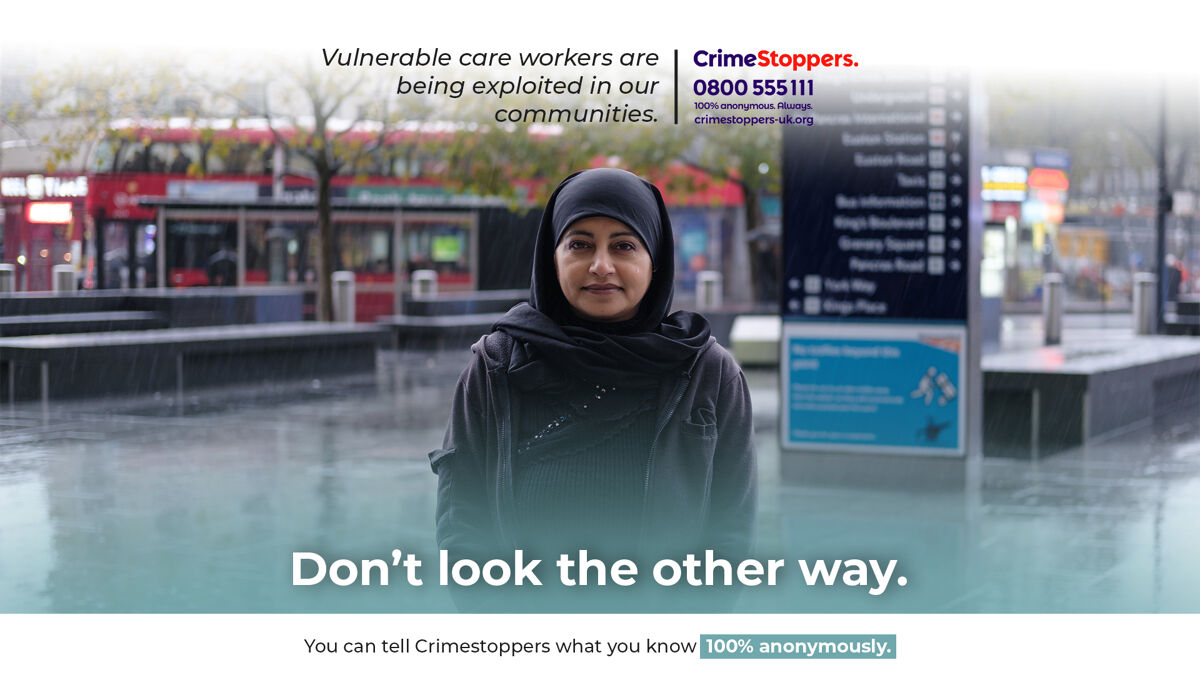London's Hidden Harms: modern slavery
We're running a campaign to tackle London’s Hidden Harms, shining a spotlight on sometimes-hidden crimes such as modern slavery, and particularly focussing on the increase in labour exploitation in the social care industry.
Identifying what could be modern slavery is the first step to stopping it. Understanding the signs to look out for could help the most vulnerable people within your community.We're encouraging people in London to learn the signs to spot, so that if you do see something, you can speak up and tell us what you know. 100% anonymously - guaranteed.
In an emergency, always call 999. If it’s not an emergency and you’d prefer to stay anonymous, contact us online or on the phone by calling 0800 555 111, 100% anonymously - guaranteed.
What is modern slavery?
The 2023 Global Slavery Index estimates that on any given day in 2021, there were 122,000 people living in modern slavery in the UK.
Modern slavery takes a number of forms, including sexual exploitation and forced labour. Often the person is forced or compelled to work, and they are often controlled by an 'employer', usually through mental or physical abuse, or the threat of abuse.
Victims can include men, women and children, and they can be of all ages and backgrounds.
Modern slavery in the social care sector
This has surged since immigration rules were relaxed and new visa routes for employment were opened up in order to address the thousands of vacancies.
Staff shortfalls in the UK care sector have left the industry vulnerable to trafficking gangs. As the supply chain gets bigger, there's more chance for exploitation.
The charity Unseen, which is working towards a world without slavery, has recorded a 30% rise in calls about the care sector in the past 12 months (918 potential victims of modern slavery indicated in the care sector, up from 708 in 2022).
What is our campaign about?
We're aiming to help protect vulnerable care workers in London and eradicate exploitation from communities, by encouraging the public to report suspicions to us, 100% anonymously.
Who are the victims, and where do they work?
Most workers are adult females. They are often recruited by agencies in their home country (the most prevalent nationalities are Indian, Zimbabwean and Nigerian), and offered work in the UK as carers.
They are told that work visas and transport will be arranged, and are enticed by the promise of good earnings as care assistants.
They work in residential care homes, nursing care homes, adult day-care centres, domiciliary or home care and hospices.
They are extremely vulnerable and live in terror of the people who've trafficked or enslaved them, who will tell them "There's no point going to the police or the local authority because they won't support you."
Signs to spot:
- Care workers being transported between venues by their employer.
- Victims may be confined to the care facility or their place of work.
- Limited freedom to leave or communicate with others.
- Long shifts without adequate breaks or rest.
- Victims may lack legal status or proper work permits.
- Personal and professional documents and ID held by employers
- Underpayment or non-payment of wages.
- Multiple care workers living in the same accommodation – especially multiple staff in one room.
- Signs of staff having to live in inappropriate spaces - floor / shed / out-house / garage.
- Looking to another to speak for them / Someone insisting on speaking for others.
- Staff kept out of the way during a visit or engagement
- Members of staff unable to communicate with their clients effectively.
- Signs of physical abuse such as unexplained injuries, bruises, or scars.
- Neglect in terms of health and safety.
You can have the confidence and trust that our service is 100% anonymous. Not even we will know who you are.
Speak up and tell us what you know. 100% anonymously - guaranteed:
Read more about our anonymity guarantee
Are you a victim of modern slavery?
- Due to our anonymity guarantee, we can't take information from victims of crime. In an emergency, always call 999.
- The UK Modern Slavery Helpline is available 24/7 to offer confidential advice and support for any victim, statutory agency, business, or member of the public regarding modern slavery suspicions or concerns. Trained Helpline Advisers are available to discuss potential signs of modern slavery and options for callers or victims in need. Call free on 08000 121 700.
Nothing to report?
- Learn more from other charities and authorities tackling modern slavery and human trafficking, including Unseen and StoptheTraffik and The Gangmasters and Labour Abuse Authority.
- You can also volunteer with Crimestoppers to raise awareness of our unique crime reporting service in your community.
